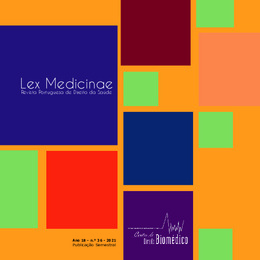Por favor, use este identificador para citar o enlazar este ítem:
https://hdl.handle.net/11000/31675Registro completo de metadatos
| Campo DC | Valor | Lengua/Idioma |
|---|---|---|
| dc.contributor.author | Ortiz Fernández, Manuel | - |
| dc.contributor.other | Departamentos de la UMH::Ciencia Jurídica | es_ES |
| dc.date.accessioned | 2024-03-05T08:45:41Z | - |
| dc.date.available | 2024-03-05T08:45:41Z | - |
| dc.date.created | 2021 | - |
| dc.identifier.citation | Lex Medicinae Revista Portuguesa de Direito da Saúde Ano 18 - n.º 36 - 2021 | es_ES |
| dc.identifier.issn | 1646-0359 | - |
| dc.identifier.uri | https://hdl.handle.net/11000/31675 | - |
| dc.description.abstract | El consentimiento informado representa un derecho de todo paciente a conocer y decidir, en el ámbito de su salud, lo que estime conveniente. En este marco, la informa- ción proporcionada por el profesional representa un requisito ineludible, ya que ha de tratarse de una actuación libre, cons- ciente y voluntaria. A este respecto, la Ley 41/2002, de 14 de noviembre, básica reguladora de la autonomía del paciente y de derechos y obligaciones en materia de información y documentación clínica establece una serie de obligaciones que los sanitarios han de cumplir, cuya finalidad es, precisamente, que los pacientes puedan formar y manifestar su voluntad y que la misma sea respetada. No obstante, a pesar de que la norma concreta ciertos aspectos, es necesario dilucidar la forma en que ha de prestarse dicha información y el contenido que ha de tener. Sobre el particular, encontramos diversos pronunciamientos del Tribunal Supremo cuya finalidad es, en última instancia, concretar los mandatos legales. Por todo ello, en el presente estudio llevaremos a cabo un análisis de las sentencias más relevantes al efecto y trataremos de extraer las conclusiones que se derivan del estudio. | es_ES |
| dc.description.abstract | Informed consent represents a right of every patient to know and decide what they deem appropriate in the field of their health. In this context, the information provided by the professional represents an inescapable requirement since it must be a free, conscious and voluntary action. In this regard, Law 41/2002, of 14 November, basic regulation of the autonomy of the patient and rights and obligations in terms f information and clinical documentation establishes a series of obligations that the health professionals have to fulfil, whose purpose is, precisely, that the patients can form and express their will and that it is respected. However, despite the fact that the rule specifies certain aspects, it is necessary to clarify how this information is provided and the content it must have. In this regard, we find various pronouncements of the Supreme Court whose purpose is, ultimately, to specify the legal mandates. Therefore, in this study, we will analyse the most relevant judgments for this purpose and draw the conclusions derived from the study | es_ES |
| dc.format | application/pdf | es_ES |
| dc.format.extent | 171-186 | es_ES |
| dc.language.iso | spa | es_ES |
| dc.publisher | Institvto Ivridico Facultade De Direito Universidade de Coimbra | es_ES |
| dc.rights | info:eu-repo/semantics/openAccess | es_ES |
| dc.rights.uri | http://creativecommons.org/licenses/by-nc-nd/4.0/ | * |
| dc.subject | Consentimiento informado | es_ES |
| dc.subject | información | es_ES |
| dc.subject | obligaciones | es_ES |
| dc.subject | responsabilidad civil | es_ES |
| dc.subject | sanidad | es_ES |
| dc.subject | Informed consent | es_ES |
| dc.subject | information | es_ES |
| dc.subject | obligations | es_ES |
| dc.subject | civil liability | es_ES |
| dc.subject | health | es_ES |
| dc.subject.other | CDU::3 - Ciencias sociales::34 - Derecho | es_ES |
| dc.title | La información en el ámbito sanitario en España: análisis de algunas situaciones controvertidas | es_ES |
| dc.type | info:eu-repo/semantics/article | es_ES |

Ver/Abrir:
Revista_36 (1)«La información en el ámbito sanitario en España análisis de.pdf
3,1 MB
Adobe PDF
Compartir:
 La licencia se describe como: Atribución-NonComercial-NoDerivada 4.0 Internacional.
La licencia se describe como: Atribución-NonComercial-NoDerivada 4.0 Internacional.
.png)